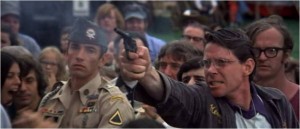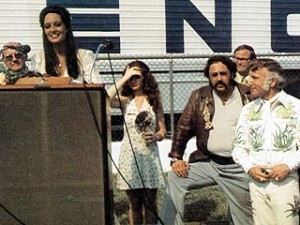NASHVILLE
Slightly tweaked from its original appearance in the Autumn 1975 issue of Sight and Sound. — J.R.
Nashville
‘A dialectic collage of unreality,’ remarked pop singer Brenda Lee, emerging from the Nashville premiere in August. After a summer full of humourless rhetoric in the American press about ‘the true lesson of ‘Watergate’, ‘the failure of our civilization,’ ‘the long nauseating terror of a fall through the existential void,’ and equally grave matters — most of it implying that a movie has to be about ‘everything’ (i.e., the State of the Union) before it can be about anything — it was refreshing to discover that someone, at long last, had finally got it right. Even if Lee’s comment was intended as a slam, it deserves to be resurrected as a tribute. For if Nashville is conceivably the most exciting commercial American movie in years, this is first of all because of what it constructs, not what it exposes.
From the moment we begin with an ad for the film itself — a blaring overload of multi-media confusion — and pass to a political campaign van spouting banalities, then to a recording studio where country music star Haven Hamilton (Henry Gibson) is cutting a hilariously glib Bicentennial anthem, Nashville registers as a double-fisted satire of its chosen terrain, and it would be wrong to suggest that its targets of derision are beside the point, even if the angle of vision subsequently widens to take in more than just foolishness. Read more


